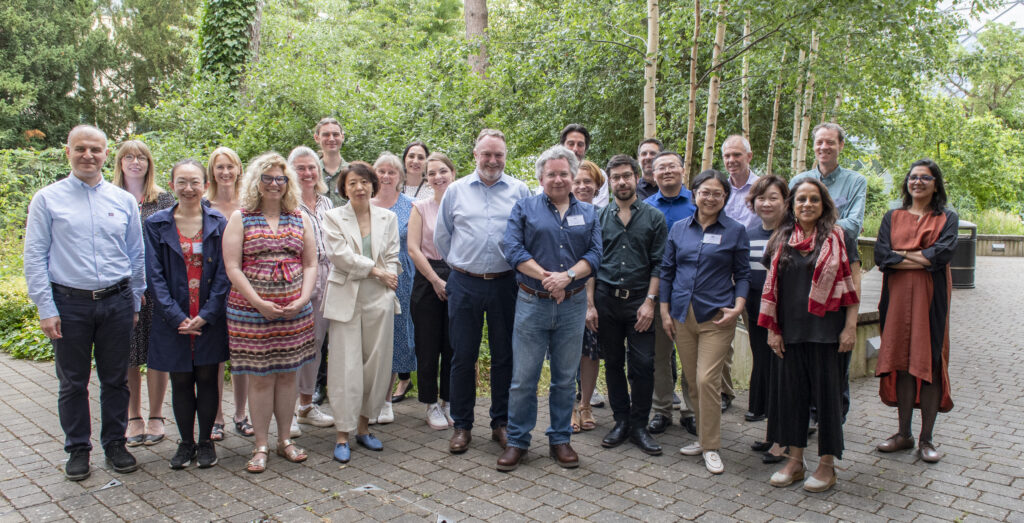



At Cambridge, the Global Humanities Initiative is embedded in the School of Arts and Humanities. The School is consistently ranked in the top five in the world QS rankings and contains eight academic faculties and departments, Europe’s largest interdisciplinary centre (CRASSH), the Leverhulme Centre for the Future of Intelligence (AI), the University Language Centre, and a flourishing digital humanities programme (CDH). Global Humanities is one of three priority themes set out by the School in its 2020-2030 Vision. Through it, Cambridge is seeking to build on, foster and further develop the study of non-European culture at undergraduate and postgraduate level, to diversity its curriculum and, in so doing, critique and value the heritage of Britain and Europe; to begin the work of diversifying its teaching body by inviting visiting lecturers from disparate parts of the world to contribute fully to its courses and programmes; and, through conferences and research projects, to pose and answer major questions through multiple cultural perspectives.
At the American University of Beirut, the Global Humanities Initiative is housed in the Faculty of Arts and Sciences. Part of AUB since its founding in 1866, FAS aspires to be at the heart of free inquiry in the Middle East and to serve the peoples of Lebanon, the region and the wider world through excellence in teaching, research, and creative endeavour. FAS also houses the Centre for Arts and Humanities, the AUB Theatre Initiative, and departments offering MA programs in Anthropology, Arabic, Archaeology, Art History and Curating, English, History, and Philosophy, and PhD programs in Arabic language and literature and in Arab and Middle Eastern History. Comparative and intercultural research and artistic practice characterizes the diverse international faculty’s work and teaching and will inform AUB’s developing role as the Arab world’s global university, with the inauguration of twin campuses in the Mediterranean and the Arabian Gulf.
Ashoka University, founded in 2014, is a Liberal Arts and Sciences University located in Haryana, India. It offers a range of subjects in the Arts and Humanities, Social Sciences, and Mathematical and Natural Sciences from undergraduate to Master’s and PhD programmes. Interdisciplinarity is at the heart of Ashoka’s pedagogy and its signature Foundation Courses for undergraduate students are unique within the Indian Higher Education sector.
Ashoka is a research university, with faculty drawn from many countries of the world. Individual projects and collaborative research, both national and international, and research undertaken by specialized Centres and multidisciplinary Centres, have enabled a vibrant research-intensive atmosphere in the university.
Ashoka’s participation in the Global Humanities Initiative is one of a number of prestigious international institutional collaborations.
The Center for the Humanities at Diego Portales University, part of the Global Humanities Network, is a space for the exchange of ideas and collaborative work between the world of academia and various cultural actors at work beyond the university. It aims to generate dialogue and confluences between different disciplines and professions, and between those who produce creative works and those who reflect on them, in order to energize intellectual life in its expressive and critical aspects. The Center for the Humanities has a group of collaborators ranging from philosophers, journalists and historians to visual artists, architects and writers. In the context of today’s university, marked by the intense specialization of research and the consequent withdrawal of academic debate from external audiences, the Center for the Humanities represents an effort to strengthen the public dimension of thought and cultural criticism.
Fudan is a comprehensive research-oriented university renowned both at home and abroad for its highly-rated arts, sciences and medicine disciplines. It boasts a total area of approximately 2,500,000 square meters that are divided into 4 campuses: Handan (main campus in Wujiaochang area), Fenglin, Jiangwan and Zhangjiang, housing 35 schools and departments that offer 11 broad subject areas, 5 state-level key laboratories, 29 provincial and ministerial-level laboratories, 17 affiliated hospitals, and libraries that hold more than 5.5 million books and countless digital resources. Also Fudan is home to approximately 4,000 international students from all corners of the globe. Fudan is a member of the elite C9 League, also known as China’s Ivy league, and ranked 31st in QS Global World Ranking 2022.
The rapid development of humanities and social sciences is an important goal for Fudan University. It will act according to the mission of constructing the “New Humanities Discipline”, promote the development of theories and academic structure that match the future needs of the country, inherit the good in the Chinese culture, and cultivate talents adaptive to the new era. It will specialize in philosophy and social sciences, step up integrative innovation of social sciences and frontier technologies, and strengthen its capability to serve the society.
Founded in 1902, NJU is a member of the Chinese C9 League (an alliance of nine elite universities in China). Taking its roots in the Central University and the University of Nanking, Nanjing University has traditional excellence in fundamental sciences and Humanities. NJU is also a pioneer in international collaborations in China. It is home to time-honored international cooperation platforms and centers such as the Johns Hopkins University – Nanjing University Center for Chinese and American Studies, Nanjing University Institute for Jewish and Israel Studies, Sino-German Institute for Legal Studies etc. And it has a UNESCO Chair for Peace Studies.
With the Global Humanities Initiative, NJU has established its own Global Humanities group composed of administraive staff and relevant faculties from the School of Arts, School of Foreign Studies, School of Government, School of History and the Department of Philosophy. Since 2021, the Global Humanities Program has been listed on the grant program of “Global Engagement for Strategic Partners” at university level.
The Global Humanities Initiative at Sabanci University is embedded within the Faculty of Arts and Social Sciences (FASS). Sabanci is internationally recognized as one of the most innovative and research-oriented universities in Turkey. FASS has multiple graduate programs in economics, psychology, political science, conflict analysis and resolution and European studies, visual arts and communications design, history, cultural studies, and gender studies. Pre-existing cooperation schemes with EU-funded projects allow significant research collaboration with multiple international partners and different stakeholders. FASS conducts highly competitive graduate student training and public outreach in multiple disciplines in social sciences and is a visible actor in social sciences and humanities nationally and internationally. FASS faculty members and graduate students working in political science, international relations, history, literature and cultural studies actively participate in all the activities of the Global Humanities Initiative.
The School of Arts is one of the flagship Schools in the College of Humanities, University of Ghana, Legon. It comprises four leading-edge and vibrant Departments, namely: Department of Archaeology and Heritage Studies, Department of History, Department of Philosophy & Classics, and the Department for the Study of Religions. The School of Arts is repositioning itself as the foundation of university scholarship, the cradle of the core disciplines we call the humanities, from which all other disciplines emanate. Through our commitment to enquiry, knowledge production and dissemination, our vision is to inspire our students and stakeholders (Ghanaian society and the international community) to explore and expand African perspectives in developmental initiatives and with environmental humanities in mind. Our Five-Year Action Plan is inspired by the University of Ghana 2024-2029 Strategic Plan. In this regard, the School of Arts’ core mission is to work in a multicultural context to produce graduates that are equipped with ideas and knowhow, that would enable them to research, critically reflect and find creative solutions to our common societal problems.